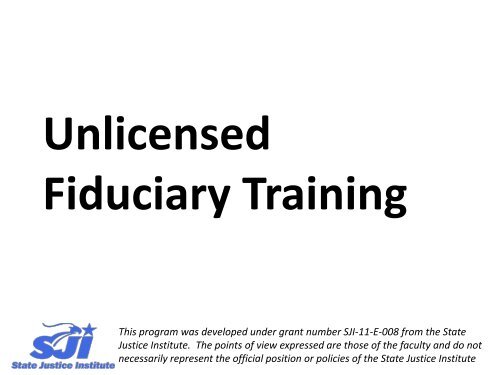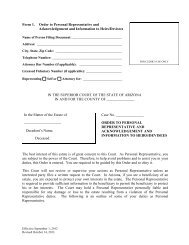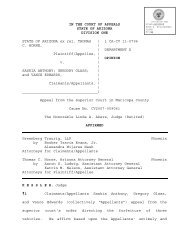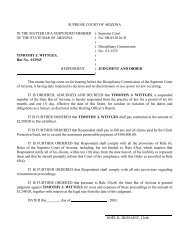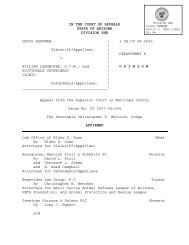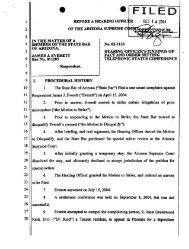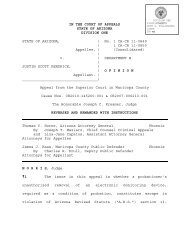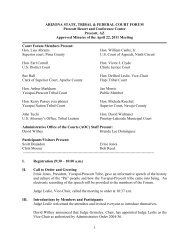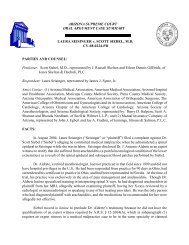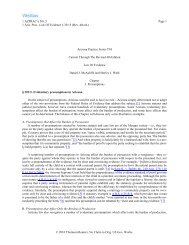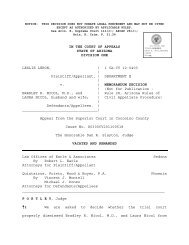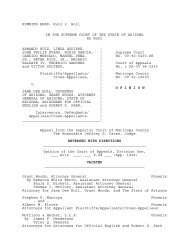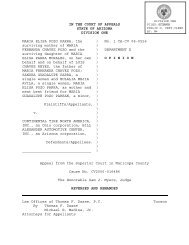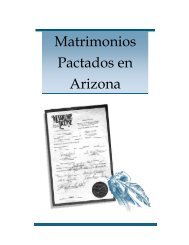Unlicensed fiduciary training - Arizona Judicial Department
Unlicensed fiduciary training - Arizona Judicial Department
Unlicensed fiduciary training - Arizona Judicial Department
Create successful ePaper yourself
Turn your PDF publications into a flip-book with our unique Google optimized e-Paper software.
<strong>Unlicensed</strong><br />
Fiduciary Training<br />
This program was developed under grant number SJI-11-E-008 from the State<br />
Justice Institute. The points of view expressed are those of the faculty and do not<br />
necessarily represent the official position or policies of the State Justice Institute
Welcome to Probate Fiduciary Training<br />
After viewing this program you<br />
will be able to :<br />
•Recall the qualifying<br />
requirements<br />
•Discuss the differences among<br />
the 3 roles<br />
•List the basic responsibilities<br />
for each role<br />
•Describe the order of priority<br />
for assigning each role
<strong>Unlicensed</strong> Fiduciary Roles<br />
GUARDIAN<br />
CONSERVATOR<br />
PERSONAL<br />
REPRESENTATIVE<br />
As an unlicensed <strong>fiduciary</strong> you may be appointed in one of 3 roles: Guardian, Conservator or Personal<br />
Representative. These roles have similarities, but also distinct differences. This overview is designed to<br />
help you determine the responsibilities associated with your appointed role.
Guardianship
What is a Guardian?<br />
GUARDIAN<br />
WARD<br />
A guardian is responsible for making personal decisions for an individual deemed incapacitated by the<br />
Superior Court, typically referred to as the “ward.” The guardian of a ward has the same rights and<br />
responsibilities as a parent does to an un-emancipated minor, except that the guardian does not have<br />
any liability to a third party. In other words, a guardian is not responsible for the debts or actions of<br />
their ward that a parent is for their child.
General Responsibilities<br />
GUARDIAN<br />
All medical and<br />
personal decisions<br />
• Medical treatment<br />
• Where the ward lives<br />
• Education and <strong>training</strong><br />
WARD<br />
The guardian is responsible for making all medical and personal decisions on behalf of the ward. For<br />
example, the guardian must consent to medical treatment, determine where the ward will live while<br />
maintaining their current standard of living, and ensure that they are receiving the education and<br />
<strong>training</strong> that they would be entitled to and which may increase their quality of life.
Qualify for Appointment<br />
GUARDIAN<br />
• Never convicted of a felony<br />
• Never removed as a guardian for a<br />
wrongdoing<br />
• Understands responsibilities of<br />
being a guardian<br />
A person must first qualify in order to be considered for appointment as someone’s guardian. They must<br />
attest (or swear) that they have never been convicted of a felony, never been removed as a guardian for<br />
wrongdoing, and that they understand the responsibilities of being a guardian.
Priority for Appointment<br />
1. Someone currently acting as guardian or conservator<br />
2. An individual nominated by the proposed ward if the court determines the individual<br />
has the ability to state who they want to be their guardian.<br />
3. The person nominated in the proposed ward’s durable or healthcare power of<br />
attorney<br />
4. The proposed ward’s spouse<br />
5. The proposed ward’s adult child<br />
6. The proposed ward’s parent (including an individual who is nominated in the Last Will<br />
and Testament of the deceased parent)<br />
7. Any relative who the proposed ward has lived with for at least 6 months prior to<br />
appointment<br />
8. The nominee of a person who is caring for or paying benefits to the proposed ward<br />
9. If the proposed ward is a veteran or the spouse of a veteran, the <strong>Department</strong> of<br />
Veterans Affairs<br />
10. A <strong>fiduciary</strong> who is licensed by the <strong>Arizona</strong> Supreme Court who is NOT the public<br />
<strong>fiduciary</strong><br />
11. The public <strong>fiduciary</strong><br />
In addition to determining if an individual is “qualified” to act as a <strong>fiduciary</strong>, the court may also assign<br />
priority to individuals based on a certain set of criteria.
Priority for Appointment<br />
4. The proposed ward’s spouse<br />
5. The proposed ward’s adult child<br />
The court has the ability to pass over an individual who has a higher priority if the court believes there is<br />
a valid reason to do so. For example, if the court determines that the durable or healthcare power of<br />
attorney presented by the proposed ward’s spouse is not a valid document, the proposed ward did not<br />
have the legal capacity to execute the document , or the spouse used undue influence to get the<br />
proposed ward to sign the document, the court may instead appoint the proposed ward’s adult child.
Conservatorship
What is a Conservator?<br />
CONSERVATOR<br />
WARD<br />
PROTECTED<br />
PERSON<br />
Determined to be<br />
incapacitated by<br />
the Superior Court<br />
Not incapacitated<br />
but needs assistance<br />
A conservator is an individual who is responsible for managing the assets – for example, money,<br />
brokerage accounts, homes, or businesses - of a “ward” or “protected person.” A ward is an individual<br />
who has been determined to be incapacitated by the superior court. A protected person is someone<br />
who has not had a guardian appointed and has not been declared incapacitated by the superior court<br />
but the court has determined that they need assistance in managing their assets. The court determines<br />
that someone needs protection if they have assets that may be wasted or lost because they cannot<br />
protect the assets themselves due to a number of reasons including mental illness, mental deficiency or<br />
chronic intoxication.
Priority for Appointment<br />
CONSERVATOR<br />
• Never convicted of a felony<br />
• Never removed as a conservator<br />
for a wrongdoing<br />
• Understands responsibilities of<br />
being a conservator<br />
Just as when being appointed a guardian, an individual who wants to be appointed as conservator must<br />
first show the court that they are qualified. They must prove they have never been convicted of a<br />
felony, never been removed as conservator due to wrongdoing, and understand the role of a<br />
conservator. Once the court has determined that an individual is qualified, the court may also assign<br />
priority to the individual based on given criteria.
Priority for Appointment<br />
1. A conservator who has been appointed in ANOTHER jurisdiction<br />
where the protected person resides.<br />
A first level priority may be assigned to a conservator who has been appointed in ANOTHER jurisdiction<br />
where the protected person resides. This is different than the guardianship priority statute as it<br />
distinguishes between someone who has already been appointed in any jurisdiction, including the one<br />
where the petition may currently be pending, and one appointed in another jurisdiction, such as<br />
another county or state.
Priority for Appointment<br />
2. Nominated by protected person<br />
3. Nominated in protected person’s<br />
power of attorney<br />
A second level priority is assigned to someone nominated by the proposed person in need of protection<br />
if the court determines that the individual has the mental capacity to make the nomination. A third level<br />
priority is an individual nominated in the proposed protected person’s durable power of attorney.
Priority for Appointment<br />
4. The proposed protected person’s spouse<br />
5. The proposed protected person’s adult child<br />
6. The parent of the proposed protected person or an individual<br />
nominated in the Last Will and Testament of the deceased parent<br />
7. Any relative who the proposed protected person has lived with for<br />
the six months prior to the petition.<br />
8. Someone nominated by an individual proving care to or paying<br />
benefits for the proposed protected person.<br />
9. If the proposed protected person is a veteran or the spouse of a<br />
veteran, than the <strong>Department</strong> of Veterans Affairs<br />
10. A <strong>fiduciary</strong> who is licensed by the <strong>Arizona</strong> Supreme Court who is<br />
NOT the public <strong>fiduciary</strong><br />
11. The public <strong>fiduciary</strong><br />
Additional levels of priority are assigned based on a certain set of criteria. However, as in a guardianship<br />
proceeding, the court has the ability to pass over an individual who has a higher priority if the court<br />
believes there is a valid reason to do so.
General Responsibilities<br />
• Manage assets of protected person<br />
• Ensure money and assets are used only<br />
for benefit of protected person<br />
• Invested properly and appropriately<br />
The conservator has the responsibility to manage the assets of the protected person as a prudent man<br />
would. In other words, the conservator must ensure that the money and assets of the protected person<br />
are used only for the benefit of the protected person. The conservator must ensure that the assets of<br />
the protected person are invested properly and appropriately to maintain the protected person’s<br />
current living circumstances.
Endorsement<br />
• Same authority as personal<br />
representative<br />
• Must wait 40 days from date of death<br />
to petition court<br />
• Individuals with an interest in estate<br />
may nominate another individual they<br />
believe is more appropriate<br />
Finally, an individual who has been appointed as the conservator may petition the court to allow their<br />
letters of conservatorship to be “endorsed.” This means that the court grants the same authority to the<br />
conservator that a personal representative has and that they may administer the estate of the decedent<br />
in accordance with the Last Will and Testament of the decedent, or by the laws of the State of <strong>Arizona</strong>.<br />
A conservator must wait 40 days from the date of death of the decedent before they apply to have their<br />
letters of conservatorship endorsed. There are a number of provisions to allow individuals with an<br />
interest in the estate to nominate an individual they believe is more appropriate to act.
Personal Representative
What is a Personal Representative?<br />
PERSONAL<br />
REPRESENTATIVE<br />
DECEDENT<br />
A personal representative (also known as an executor or administrator in other states) is a person<br />
responsible for handling the assets of a deceased, the decedent, individual.
Priority for Appointment<br />
1. The person nominated in the Last Will and Testament<br />
2. The surviving spouse who is also a devisee (Devisee is a person<br />
named in the Will to receive property of the decedent)<br />
3. Other devisees of the Will<br />
4. The surviving spouse<br />
5. Other heirs of the decedent (An heir is someone who is authorized<br />
to receive the property of a decedent by law such as children,<br />
grandchildren, siblings, etc. Just because someone is an “heir at<br />
law” does not mean they are the devisee of a Will.)<br />
6. If the decedent was a veteran or the spouse of a veteran, the<br />
<strong>Department</strong> of Veteran’s Affairs<br />
7. Any creditor if a probate has not been initiated 45 days after the<br />
death of the decedent<br />
8. The public <strong>fiduciary</strong><br />
The court may assign priority to the individual appointed as personal representative based on a certain<br />
set of criteria.
Testate v. Intestate<br />
Testate Intestate<br />
Personal representative<br />
administers estate assets in<br />
accordance with Last Will and<br />
Testament<br />
“Intestate Succession”<br />
Outlines who receives the<br />
property of the decedent<br />
Testate administration means the decedent left a valid Last Will and Testament and the personal<br />
representative shall administer the assets of the estate in accordance with the provisions of the Last<br />
Will and Testament. An intestate estate is one in which an individual dies without leaving a valid Last<br />
Will and Testament and their assets pass according to what is referred to as “intestate succession.” This<br />
is a provision in the law that outlines who is to receive the property of the decedent; typically, the<br />
spouse, children, grandchildren, parents, siblings, nieces/nephews, cousins, or other relatives.
General Responsibilities<br />
PERSONAL<br />
REPRESENTATIVE<br />
• Distributing property of decedent<br />
• Last Will and Testament<br />
• Laws of the State of <strong>Arizona</strong> if no Will<br />
• Protect property of decedent for<br />
benefit of beneficiaries<br />
The personal representative is responsible for distributing the property of the decedent based on<br />
either the terms of the Last Will and Testament or the laws of the State of <strong>Arizona</strong> if the decedent died<br />
without a Will. The personal representative must protect the property of the decedent for the benefit<br />
of the beneficiaries.
Thank you<br />
Thank you for viewing this<br />
<strong>training</strong> video. The welfare<br />
of the ward and/or<br />
protected person is of<br />
utmost importance to the<br />
court.<br />
For more information about<br />
Probate please visit the<br />
<strong>Judicial</strong> Branch website<br />
devoted to Probate at<br />
www.azcourts.gov/probate
Certificate of Completion<br />
By virtue of accessing this on-line program and printing and<br />
submitting this certificate for the <strong>training</strong> module<br />
<strong>Unlicensed</strong> Fiduciary Overview<br />
The user attests to viewing the program in its entirety.<br />
Printed Name<br />
Signature<br />
Date<br />
<strong>Arizona</strong> State Supreme Court


